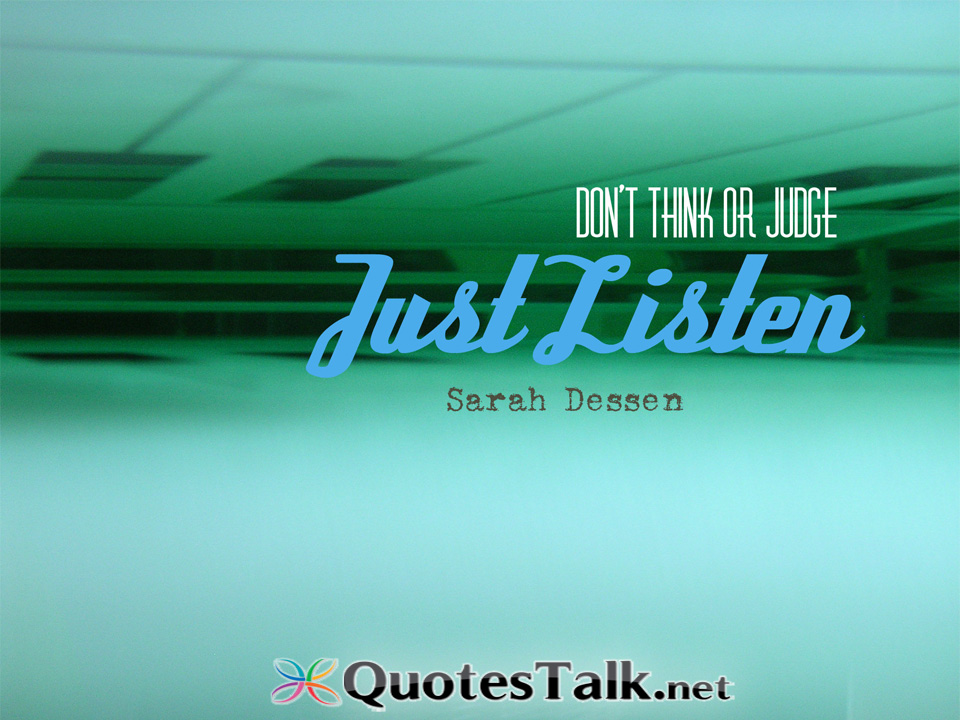We Listen And We Don’t Judge: The Power Of Empathy In Communication
Imagine walking into a room where everyone listens to you without judgment. Sounds like a dream, right? But what if I told you that this dream can become a reality? The concept of "we listen and we don't judge" is more than just a phrase; it’s a powerful philosophy that can transform relationships, workplaces, and even entire communities. In a world that often feels divided, learning how to truly listen without judgment can bridge gaps and foster deeper connections.
Let’s face it, communication is tricky. We’re all guilty of jumping to conclusions, interrupting others, or letting our biases cloud our judgment. But here’s the thing—when we make a conscious effort to listen actively and without judgment, we open doors to understanding and growth. Whether you’re a manager, a parent, a friend, or simply someone who wants to improve their interpersonal skills, mastering this art can change your life.
Now, let’s dive deeper into why this philosophy matters so much in today’s fast-paced world. Stick around because I’m about to drop some knowledge that could revolutionize the way you interact with others. So grab a coffee, get comfy, and let’s explore the magic of listening without judgment!
Read also:Mugshots Clinton Nc The Untold Stories Behind The Lens
What Does “We Listen and We Don’t Judge” Really Mean?
At its core, "we listen and we don't judge" means creating a safe space for open and honest communication. It’s about giving someone your full attention without letting preconceived notions or personal biases get in the way. Think of it as a mental reset button—when you truly listen, you’re not just hearing words; you’re understanding the emotions, intentions, and experiences behind them.
This approach isn’t just feel-good advice; it’s backed by science. Studies show that when people feel heard and understood, they’re more likely to trust others and engage in meaningful conversations. In fact, active listening has been linked to improved mental health, stronger relationships, and even better workplace productivity. So yeah, it’s kind of a big deal.
Why Is Judgment Such a Big Deal in Communication?
Here’s the thing about judgment—it’s sneaky. You might not even realize you’re doing it until it’s too late. When we judge someone, we’re essentially putting up walls between us and them. Those walls can lead to misunderstandings, resentment, and even conflict. And honestly, who needs that?
Let me break it down for you. Judgment often stems from fear—fear of the unknown, fear of being wrong, or fear of vulnerability. But when we let go of judgment, we create space for empathy and connection. It’s like trading in your armor for a warm hug. And trust me, hugs are way better.
How to Practice Active Listening Without Judgment
Active listening isn’t just about nodding your head and saying “uh-huh” every few minutes. It’s about being present, engaged, and open-minded. Here are a few tips to help you master this skill:
- Give the speaker your undivided attention. Put away your phone, turn off the TV, and focus on the conversation.
- Avoid interrupting. Let the other person finish their thoughts before responding.
- Ask clarifying questions. If something doesn’t make sense, ask for more details instead of jumping to conclusions.
- Reflect back what you’ve heard. Paraphrase the speaker’s words to show that you understand.
- Be patient. Sometimes people need time to express themselves fully.
Remember, active listening is a two-way street. By practicing it, you’re not only helping others feel heard but also gaining valuable insights yourself.
Read also:John Feggo
The Science Behind Non-Judgmental Communication
Did you know that our brains are wired to seek connection? It’s true! When we feel understood, our brain releases oxytocin—the “feel-good” hormone. This hormone promotes trust, bonding, and emotional well-being. On the flip side, when we feel judged or misunderstood, our brain releases cortisol—the stress hormone. And no one wants to be stressed out, right?
Research shows that non-judgmental communication can improve mental health outcomes, especially for people dealing with anxiety, depression, or trauma. It creates a safe space where individuals feel free to express themselves without fear of criticism. And in today’s world, that kind of safety net is invaluable.
Key Statistics to Consider
Let’s talk numbers. According to a study published in the Journal of Applied Psychology, employees who feel heard and valued at work are 4.6 times more likely to perform their best. Another study found that couples who practice non-judgmental communication are 70% less likely to experience relationship conflicts. These stats don’t lie—listening without judgment works!
Real-Life Examples of “We Listen and We Don’t Judge” in Action
Wondering how this philosophy plays out in real life? Let me share a few examples:
**In the Workplace:** Imagine a team meeting where everyone feels free to share ideas without fear of ridicule. This kind of environment encourages creativity and innovation. Instead of shooting down suggestions, leaders can ask thoughtful questions and explore possibilities together.
**In Relationships:** Picture a couple having an honest conversation about their feelings. Instead of blaming or shaming each other, they listen actively and work through issues together. This approach strengthens their bond and builds long-term trust.
**In Communities:** Think about a neighborhood where residents come together to discuss local concerns. By listening without judgment, they can find common ground and collaborate on solutions that benefit everyone.
Common Barriers to Listening Without Judgment
Of course, practicing this philosophy isn’t always easy. There are plenty of barriers that can get in the way, such as:
- Bias: We all have them, but recognizing and challenging our biases is key to becoming better listeners.
- Time constraints: In today’s fast-paced world, it’s tempting to rush through conversations. But taking the time to truly listen can make all the difference.
- Emotional triggers: Sometimes, certain topics or words can set us off. Learning to manage these triggers is essential for maintaining open communication.
Overcoming these barriers takes practice, patience, and self-awareness. But trust me, it’s worth it.
How to Create a Judgment-Free Zone
Creating a judgment-free zone starts with setting clear expectations. Whether you’re leading a team, managing a household, or organizing a community event, communicate the importance of listening without judgment. Here are a few ideas to get you started:
- Establish ground rules for conversations, such as no interrupting or criticizing.
- Encourage open dialogue by asking open-ended questions.
- Model the behavior you want to see. If you want others to listen without judgment, lead by example.
Remember, a judgment-free zone doesn’t mean avoiding difficult conversations. It means approaching those conversations with empathy and understanding.
The Role of Empathy in Non-Judgmental Communication
Empathy is the secret ingredient in non-judgmental communication. When we empathize with others, we’re able to see things from their perspective and respond with compassion. But here’s the catch—empathy isn’t just about feeling sorry for someone. It’s about truly understanding their experience and validating their emotions.
Research shows that empathy can improve communication, reduce conflict, and enhance overall well-being. So next time you’re in a conversation, take a moment to put yourself in the other person’s shoes. You might be surprised by how much you learn.
Practicing Empathy in Daily Life
Here are a few simple ways to incorporate empathy into your daily interactions:
- Listen carefully to what others are saying, both verbally and non-verbally.
- Acknowledge their feelings, even if you don’t agree with their perspective.
- Offer support or assistance when appropriate.
Empathy isn’t a one-time thing—it’s a mindset that can transform the way you interact with the world.
Conclusion: Why “We Listen and We Don’t Judge” Matters
Let’s recap what we’ve learned. “We listen and we don’t judge” is more than just a catchy phrase—it’s a philosophy that can change lives. By practicing active listening, overcoming barriers, and embracing empathy, we can create a world where everyone feels heard and valued.
So here’s my challenge to you: go out there and start listening. Put down your assumptions, open your mind, and let people share their stories with you. You never know what you might learn—or who you might help along the way.
And don’t forget to spread the word! Share this article with your friends, family, and colleagues. Together, we can build a culture of understanding and compassion. Now that’s a world I want to live in!
Table of Contents
- What Does “We Listen and We Don’t Judge” Really Mean?
- Why Is Judgment Such a Big Deal in Communication?
- How to Practice Active Listening Without Judgment
- The Science Behind Non-Judgmental Communication
- Real-Life Examples of “We Listen and We Don’t Judge” in Action
- Common Barriers to Listening Without Judgment
- How to Create a Judgment-Free Zone
- The Role of Empathy in Non-Judgmental Communication
- Practicing Empathy in Daily Life
- Conclusion: Why “We Listen and We Don’t Judge” Matters


